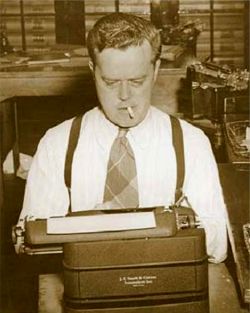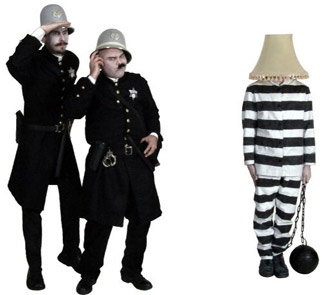ST. PETERSBURG, Fla. – A man who was discovered to have stood in for his twin brother in a May 4 court appearance was sentenced to six months in jail for “direct criminal attempt” – an offense a judge witnesses in a court.
Marcus Mauceri, who is thirty, claimed under oath to be his brother, Matthew, and agreed to be fingerprinted to establish his identity.
When the procedure revealed the truth, Marcus said he’d appeared to aid his brother, whom he knew would be late.
This is all you need to know about this story, but it is nothing you’d know if you read the first seven paragraphs of May 5 story posted on tampabay.com, the Web site of the St. Petersburg Times:
Something just didn’t seem right to attorney Jimmy Thomas when he talked to his client before his fraud trial Tuesday.
The 30-year-old man did not seem to remember basic aspects of the case they had discussed.
Thomas knew that his client, Matthew Mauceri, had a twin brother named Marcus.
Thomas had represented both men in court, and the two often changed their appearances – sometimes [wearing] beards or goatees, sometimes clean-shaven.
Could the man in court Tuesday be the twin?
Thomas faced an ethical pinch few lawyers have encountered: Should he reveal his suspicion that his client was an imposter?
Ultimately he did, and his suspicion was correct.
Only in the eighth paragraph do we encounter what in journalism is known as the “nut” graph – the paragraph with the story's true news nugget:
Marcus Mauceri had taken the place of his brother, Matthew, at the trial. The reason: He claimed his brother was flying in from out of state and couldn’t make it to the courthouse on time.
In news reporting, the “lead” – a story’s first paragraph – is meant to include that nugget. More than one press critic has lamented the inroads made by flash storytelling into simple who-what-where-when-why-how reporting. One wrote:
Among the major menaces to American journalism today (and there are so many that it hardly seems worth while even beginning this little article) is the O.Henry-Irvin Cobb tradition. According to this pretty belief, every reporter is potentially master of the short-story, and because of it we find Human Interest raising its ugly head in seven out of every eight news columns and a Human Document being turned out every time Henry H. Mackle of 1356 Grand Boulevard finds a robin or Mrs. Rasher Feiman of 425 West Forty-Ninth Street attacks the scissors grinder.
Copy readers in the old days used to insist that all the facts in the story be bunched together in the opening paragraph. This never made for a very moving chronicle, but at least you got the idea of what was going on. Under the new system, where every reporter has his eye on George Horace Lorimer, you first establish your atmosphere, then shake a pair of doves out of the handkerchief, round off your lead with a couple of bars from a Chopin etude, and finally, in the next to last paragraph, divulge the names and addresses and what it was that happened. …
Most of the trouble began about ten years ago when the Columbia School of Journalism began unloading its graduates on what was then the N.Y. Tribune (retaining the best features of neither). …
Fine writing in news stories was actually encouraged by the management and daily prizes were offered for the best concealed facts. The writer of this article was a reporter at the time – “the worst reporter in New York City” the editors affectionately called him – and one day he won the prize with a couple of sticks on the funeral of Ada Rehan. This story consisted of two paragraphs of sentimental contemplation of old-time English comedy with a bitterly satirical comparison with modern movie comedy, and a short paragraph at the end saying that Ada Rehan was buried yesterday. Unfortunately the exigencies of make-up necessitated the cutting of the last paragraph; so the readers of the Tribune never did find out what inspired this really beautiful tribute to somebody. …
A picture of the City Room of [one New York paper], by one who has never been there, would disclose a dozen or so nervous word artists, each sitting in a cubicle furnished to represent an attic, sipping at black coffee, with now and then a dab of cocaine, writing and tearing up, writing and tearing up, pacing back and forth in what the French call (in French) le travail du style. One feels that back copies of [that paper] should be bound and saved for perusal on rainy days when the volumes of “Harpers Round Table” have begun to pall.
The writer quips that soon such a style will creep even into the reporting of overseas news, and concludes:
When this has happened, we can have newstickers installed in our homes and let the newspapers give themselves over entirely to the belles lettres.
This was written by Robert Benchley for The New Yorker.
In 1925.
-------------------------------
ADDENDUM (9 May 2010): As incisive as is Mr. Benchley's dissection, things changed at the magazine in the next decade, according to Genius in Disguise, Thomas Kunkel's 1995 biography of The New Yorker founder and editor Harold Wallace Ross.
Kunkel writes that there was a "happy development that distinguished The New Yorker of the late Thirties. This was the explosion of reporting talent at the magazine, and the growing prominence of their journalism. These new voices belonged to young writers, most with newspaper experience but all with freer, more interpretive writing styles that was typical of the dailies. They drew on the fiction techniques of narrative, character development, shading and irony to tell their stories - stories that just happened to be true. Their so-called literary journalism was a hybrid of a very high order."
These writers, Kunkel adds, "probably did the most to advance the innovative, literate reportage that became a New Yorker trademark. They set the standard for all the great New Yorker reporters who followed, as well as the so-called New Journalists of the Sixties." Kunkel is referring to writers such as Gay Talese, Tom Wolfe, and Hunter S. Thompson, among many others.
So, you see, one man's disdain is another decade's Big Bang.
 "Police Blotter" items often are written by the most junior member of a paper's staff. This person is learning, on the job, how to write in journalese, a language which resembles English not hardly a'tall.
"Police Blotter" items often are written by the most junior member of a paper's staff. This person is learning, on the job, how to write in journalese, a language which resembles English not hardly a'tall.  That being said, we have nothing but good wishes for our intrepid if inexperienced reporter, even if he/she only exists in the fevered First of All imagination. To enter upon a career in journalism at this juncture in the Fourth Estate's enduring fadeout is brave beyond compare. Soon all journalists will be writing short pieces using sticks on leaves which they'll float down the river to the next village. But it will be called "Tweeting."
That being said, we have nothing but good wishes for our intrepid if inexperienced reporter, even if he/she only exists in the fevered First of All imagination. To enter upon a career in journalism at this juncture in the Fourth Estate's enduring fadeout is brave beyond compare. Soon all journalists will be writing short pieces using sticks on leaves which they'll float down the river to the next village. But it will be called "Tweeting." 




















